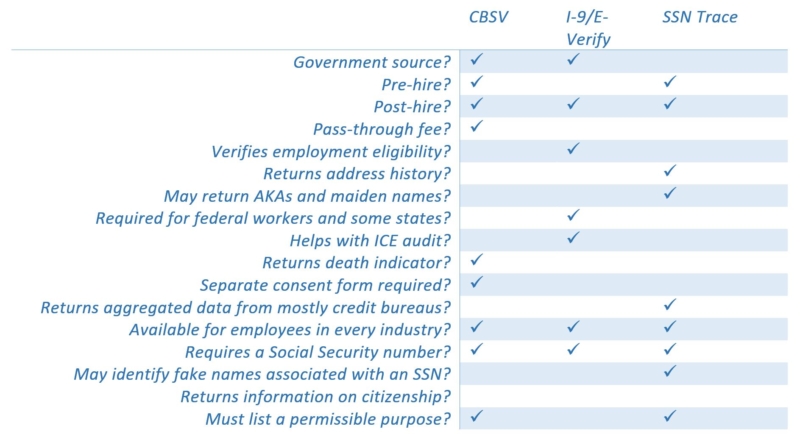There are three types of employment screening products that use a person’s Social Security number (SSN) as the main data element – Consent-Based Social Security Number Verification (CBSV), I-9/E-Verify and an SSN trace. While the SSN data element is the one common denominator, these products are very different in permissible purpose, time frame of the screening process and data source. The CBSV search taps into data from the Social Security Administration (SSA), SSN trace data come from the credit bureaus and E-Verify returns data from the Department of Homeland Security and SSA. We will explore the benefits and other differences of these products and how they are used as part of a comprehensive screening package for employers.

Consent-Based Social Security Number Verification (CBSV)
Consent-Based Social Security Number Verification (CBSV) can be a very important part of an employer’s screening package. The CBSV search taps into the actual data from the Social Security Administration (SSA) to verify a name and date of birth match with the Social Security number entered. The results given from the SSA include a “yes,” “no,” or an indicator that the SSN is associated with someone who has died.
Pros:
- Authoritatively verifies that the SSN and name provided match government records.
- Works even for younger people who are often not represented in SSN trace repositories.
- Can be used for any purpose whatsoever – as long as the applicant authorizes the use.
- Eliminates wasted expenses on recruiting, additional background screening and training.
- Reduces the risk that an employer be fined or sanctioned by the Internal Revenue Service.
- Helps prevent fraud and reduces the number of identity theft incidents.
Cons:
- The most expensive SSN product.
- Requires an actual paper form to be signed by the applicant.
- Takes about half a business hour to complete (when ordered through Accio Data).
But the CBSV search in no way is to be used to verify a person’s identity, nor does it verify a person’s eligibility to work in the United States. The CBSV should never take the place of the I-9/E-Verify process, and the CBSV search does not satisfy the Department of Homeland Security’s requirements.
The fee from the SSA is currently $2.25. Most companies pass that fee to the client much like a court fee on a criminal search.
I-9/E-Verify
Unlike CBSV, the I-9/E-Verify process is used for the purpose of verifying someone’s eligibility to work in the United States. This process takes place in the first three days of a person’s employment, and not before. E-Verify is mandatory for the federal government, as well as federal contractors and subcontractors. In addition, about half of the states have passed laws to require employers utilize E-Verify to some degree.
The Form I-9 works together with an E-Verify search, which compares the information an employee provides on Form I-9, Employment Eligibility Verification, against millions of governmental records and provides results within seconds. If the information matches, the employee is eligible to work in the United States. If the information does not match, E-Verify will alert the employer, and the employee will be allowed to work while he or she resolves the issue. Although the search requires the employee have an SSN, having that SSN does not always mean the employee is authorized to work in the United States.
Pros:
- A great way to protect them during a possible U.S. Immigrations and Customs Enforcement (ICE) audit.
- Having all of that I-9 information stored in one place electronically can make those audits a breeze.
Cons:
- Not allowed to be used in the pre-employment process.
Screening firms usually charge a small fee for the convenience of handling this process electronically on behalf of their employer clients.
Social Security Number (SSN) Trace
And if you are still wondering, CBSV and I-9/E-Verify are very different from an SSN trace, which simply searches information from aggregators of mostly credit bureau data to determine address or resident history on an applicant.
Pros:
- Can be used in pre-employment.
- The data is used to find more jurisdictions to search for a more complete and accurate background report.
- May return additional names, such as AKAs or maiden names, for a more complete and accurate background report.
Cons:
- The information may not paint a complete picture of someone’s address history. An applicant could spend an entire year living in one location and never have an occasion to apply for credit or communicate with the credit bureaus during that time.
- Many SSN Trace searches may also return false positive names, or “fat finger” data entry mistakes, that may tie a different name to the SSN.
While all three SSN-related products have their merits, they are all very different. Knowing the various benefits will help CRAs better market these searches to clients and could help increase revenue per report.

Barry Boes is the Founder and CEO of Accio Data.